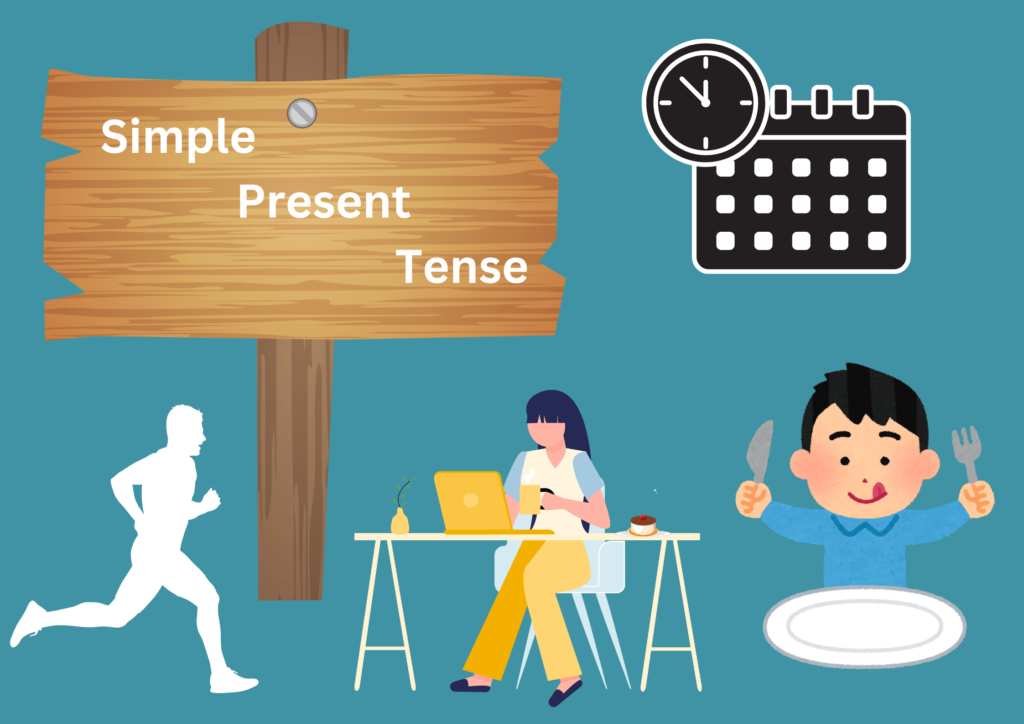In this explanation of the simple present tense, I will clarify when to use it, how to use it correctly, and common mistakes to avoid when using this tense.

What is Tenses?
Tenses are simply the way we talk about the time of an action in English. What do we mean by time? We mean the past, the present, and the future, right? These are all different times, and we have different tenses to express them.
Time has three Broad Categories:
- Present
- Past
- Future
Two basic Ways, We can speak about the present in English and they are:
- The Present Simple
- The Present Continous (Present Progress)
1. The Present Simple Tense:
Simple Present Tense we can Talk about daily actions or regular actions. 70% of Spoken English is Present Tense & 57% of Spoken English is Present Simple Tense..
Structure = Subject + Base form of Verb
=> I / You / We / They & Plural Nouns - (V1) = Work, Play, Do, Run, Eat, etc...- I drink Tea.
- I wake up at 5 am daily/every day.
- We go to the gym daily.
- We drink tea at 6:20 am daily.
- You drink tea at 10 am daily.
- They ride horses.
- Pavan drinks three cups of coffee every day.
=> He / She / It / & Singular Nouns - (Vs) = Works, Plays, Does, Runs, Eats, etc...- He climbs,
- She speaks,
- The ball bounces
- My father wakes up at 6 am daily/every day.
- Sanjana drinks coffee at 7 every morning.
The simple present tense is used to talk about:
Permanent Situations:
“We can use the present simple tense to talk about things that are permanent or generally true, okay?”
- We live in Hyderabad.
- He works at a bank.
- She wakes up at 5:00
Daily Routine:
“A routine is something you do regularly.”
- I wake up at 8:00
- We go to sleep at 10:00.
- They take a shower every day.
Universal Facts:
It is an established scientific fact, not a matter of personal opinion or decision-making; it is an undeniable truth.
- The rises in the East.
- The Moon shines at night.
- Birds fly.
- Water boils at 100 degrees Celsius.
- Two and two make four.
- Ice on the mountain melts in summer.
- Lions eat meat.
- Cows eat grass.
Habitual, regular or repeated action:
- I drink tea twice a day.
- Rohit often bites his nails.
- My brother drinks only coffee.
- I go to bet at 10 pm daily.
- We go on a holiday once a year.
Likes/ Dislikes:
- I like Potatoes.
- We love our parents.
- They enjoy nature walks.
- I prefer coffee to tea.
- I dislike bitter gourd.
Schedules:
“A schedule tells us when something will happen, and that’s connected to this point, right? It’s about a regularly scheduled event.”
- Our class starts at 10:30 am.
- The flight leaves at noon.
- The train arrives at 6 pm.
- The bus is at 2 pm.
- The movie starts at 4 o’clock.
Future official events:
The exams commence next month. The course ends in the last week of this month.
Frequency:
Here’s a corrected version:
“Adverbs of frequency describe how often something happens. Let’s first look at the sentence below.”
She always takes the bus.
Feelings:
We feel happy
Appearance:
Flowers looks beautiful
Senses:
This curry smells nice. Honey tastes sweet.
Proverbs:
Slow and steady wins the race.
Narrating stories:
- A lion catches a deer. He goes to his den…
Always (100%):
“So, ‘always’ is a word that tells us how often something happens, and all of these words down here are similar. always is like 100% of the time.”
Never (0%):
“We have various words to describe frequency. For example, the word ‘never’ means 0%—it indicates that something does not happen at all.”
- She never takes the bus.
Rarely: (10-20%):
- She rarely goes to the gym, preferring to exercise at home.
- He rarely eats fast food because he prefers cooking his meals.
She rarely takes the car.
Sometimes: (50%):
- She sometimes takes the bus.
- She sometimes goes for a walk in the evening after dinner.
- He sometimes forgets where he left his keys.
Often: (75%):
She often takes the Scooty.
The 3 sections are Positive Sentences, Negative Sentences, and Questions. We will go through each one step by step.
1. Positive Sentences (Subject + base form of the verb):
I / We / You / They, we just say Work (- (V1)
- I Work
- You Work
- We Work
- They Work
He / She / It, we just say Works – (Vs)
- She Works
- He Works
- It Works
2. Negative Sentences(Subject + do/does + not + base form of the verb):
Helping verbs ‘do’ and ‘does’ are used in the simple present tense to make sentences. In negative sentences, the main verb is always in the base form (V1).
I /We / You / They, We just say do not work(don’t).
- I don’t work.
- You don’t work
- We don’t work
- They don’t work
He, She, It, We just say doesn’t(does not)
- He doesn’t work
- She doesn’t work
- It doesn’t work
3. Question (Do/Does + subject + base form of the verb):
In the question, we must also use the helping verbs: “do” & “does”.
Note: Do/does + NOT always comes before the main verb.
- Do I Work?
- Do You Work?
- Do We Work?
- Do They Work?
- Does He Work?
- Does She Work?
- Does It Work?
Simple present is formed thus:
- Subject + verb or verb+s (Affirmative)
- Subject + don’t or doesn’t + verb (negative)
- Do / does + subject + verb (interrogative)
Indicators:
Daily, every day, usually, sometimes, always, often, never, rarely, seldom, hardly, once in a week/ month/ year, occasionally, regularly etc.
